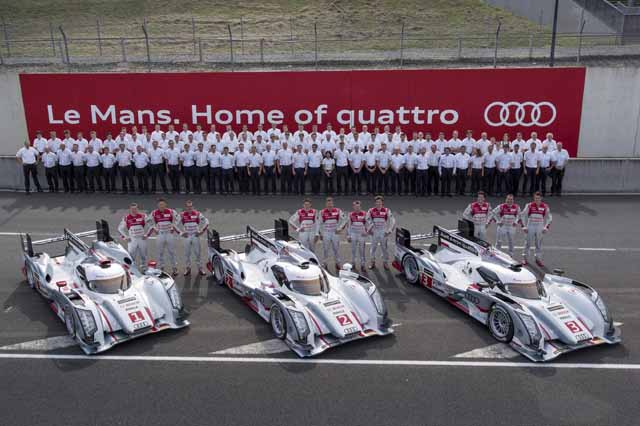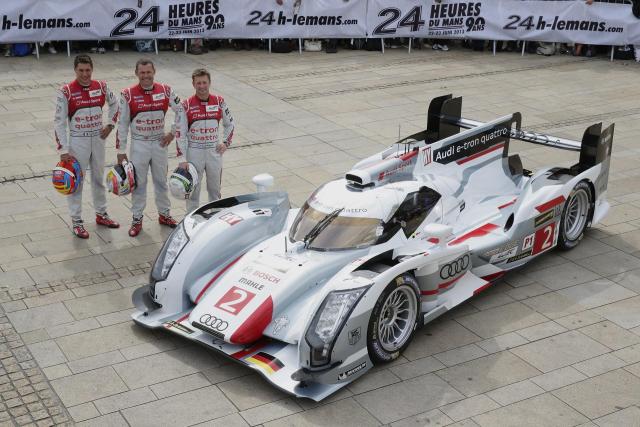Truth in Engineering, as advertised.
 Monday, June 17, 2013 at 04:08PM
Monday, June 17, 2013 at 04:08PM By Peter M. De Lorenzo
Detroit. Audi will be competing at the 24 Hours of Le Mans for the fifteenth time this year, which marks the 90th anniversary of the French endurance classic. The German luxury-performance manufacturer will be shooting for an incredible twelfth win in the most prestigious sports car race in the world, which runs this coming Saturday.
It’s important to remember where Audi was back in the late 90s when they began their quest to conquer Le Mans. The German manufacturer was viewed as a perennial “second-tier” luxury-performance contender compared to its direct competitors, BMW and Mercedes-Benz.
In this market specifically, Audi had taken years to recover from the hatchet job done on the brand by CBS’ “60 Minutes” when the TV news magazine tried to bury the manufacturer with claims that it built cars that had a tendency for unintended acceleration back in 1986. (It was later proven to be false, it was attributed to driver error.)
Audi slowly recovered from that fiasco over a ten-year period (but not before sales in this country plunged almost 75 percent initially), but even though it built some highly impressive machines it couldn’t crack the code and break through to the top level occupied by BMW and Mercedes, and it frustrated the corporate overlords of the brand, especially Dr. Ferdinand Piech, the supreme leader of the VW Group, Audi’s parent company.
How were they going to overcome this, they asked themselves? How would they set about convincing the consumer public that Audi deserved a seat at the head automotive table?
Audi decided that they were going to capitalize on their march-to-a-different-drummer engineering persona and elevate the brand through design vision, engineering innovation and a renewed focus on the integrity of the product overall.
That’s all well and good, of course, because any manufacturer can set that list of priorities on the table, and many have and still do to this day. But the real issue is does the manufacturer in question have the guts and gumption necessary to follow through on that list of priorities, when corporate political winds constantly churn in different directions and it’s so easy for an organization to lose focus?
Audi has answered those questions convincingly.
Audi’s unwavering drive to succeed is what has separated the company from every other manufacturer in the world. It’s one thing to publicly declare that you “never follow” and that you think you’re among the best car companies in the world, but it’s quite another to back that vision up, and Audi has.
Audi executives knew, however, that even making great vehicles wasn’t enough. The image-wrangling component of this business demands more, and Audi needed a competitive arena to showcase their technical and engineering prowess. Formula 1 was dismissed from the consideration set because Audi wanted a more demonstrable connection to the engineering development going on in their car programs, which is why attacking the challenge that defines the 24 Hours of Le Mans seemed to suit the manufacturer perfectly.
The most interesting thing about Audi’s eleven wins to date at the most prestigious sports car race in the world? (Actually twelve, because when the VW’s Group Bentley division won at Le Mans in 2003 it was largely an Audi underneath.) They could have stopped after winning two or three times quite easily. Manufacturers have dined on less for decades while wearing the phrase “Le Mans-winning Heritage” like a badge of honor and using it to sell cars that have absolutely nothing to do with that race-bred heritage.
But Audi didn’t stop at two or three. They kept winning and improving their technology while deploying it in their production cars as a matter of course.
This year, despite a lack of serious competition, Audi is predictably not resting on its laurels. (Toyota has entered prototypes to challenge the Audi team, but they’re expected to just keep Audi honest and not challenge for the overall win. Toyota has petitioned the Le Mans organizers to restrict the Audis so that they will be more competitive over the 24 Hours, but whether or not these changes will pan out for Toyota remains to be seen.) The Audi R18 e-tron quattro diesel hybrid racing machines have been thoroughly revised with respect to the engines, the hybrid systems and their ultra-lightweight design. The Audi racers will also be running with new aerodynamic tweaks especially configured for the blistering high-speed sections that comprise the Circuit de la Sarthe at Le Mans.
Audi is also using high-performance LED headlights featuring matrix-beam technology, a digital rearview mirror with an AMOLED display and other forward-thinking technical solutions. And as with most technologies first pioneered on the Le Mans racing program, variations on these will find their way into Audi’s production machines down the road.
(A good example of Audi’s unwavering focus and commitment? In Europe, Mercedes-Benz was the acknowledged leader when it came to diesel-powered vehicles - a huge market over there - whereas Audi was barely on the map. What did Audi do? They exploited an advantage in the Le Mans regulations that favored diesel-powered cars, and converted to turbo-diesel power (TDI) in their racing machines. They have now won Le Mans six times with diesel power, and their European market penetration with diesels is on an upward trajectory.)
How Audi has gotten to this point should be a lesson for all auto manufacturers because it demonstrates a level of focused consistency, a fundamental unwillingness to settle for the status quo and an unwavering commitment to win that few corporate overlords at most other car companies can fathom, let alone emulate.
What Audi is doing isn’t easy by any stretch of the imagination and it goes far beyond any ROI matrix that other manufacturers will muster when presented with the opportunity to compete – and win.
Other manufacturers would hand-wring over the business case until there were no numbers left to contemplate. Or they’d dismiss the idea out of hand as being “wasteful,” which is a common refrain from manufacturers whose overriding interest isn’t producing better cars, or improving the way they go about designing, engineering and building those cars - but to make more money and please their shareholders. Not that there’s a anything wrong with making money, of course, but if profitability becomes a company’s sole raison d’etre, bad things usually ensue. (This last passage is clearly over Mr. Akerson’s head, as his “cut and commonize to prosperity” philosophy will leave GM twisting in the wind by the time he finally takes his leave from that company.)
Winning at the 24 Hours of Le Mans consistently over a decade is an incredible achievement, but what might be even more impressive is the fact that Audi has now elevated its brand to the point where many consider its position to be at the top of the luxury-performance class, ahead of BMW and Mercedes, which, remarkably enough, was the whole point of the exercise to begin with.
Sometimes, fundamental resolve by the True Believers in a car company results in victories on the racetrack and an image enhancement in the showrooms in one fell swoop.
In Audi’s case it isn’t the now-classic industry adage “win on Sunday, sell on Monday” that’s on display, because that doesn’t do justice to what they’re doing.
In Audi’s case it’s more like “design, engineer and build the best damn vehicles you can muster and then emphatically demonstrate your technical prowess in the white-hot heat of competition for all to see, and then people will start believing in the brand.”
Next year, everything changes, as the aforementioned Dr. Piech is officially encouraging Porsche (another diamond in the VW Group stable) to compete directly against Audi for the overall victory at the 24 Hours of Le Mans. It will be “Truth in Engineering” (Audi) against “Excellence Was Expected” (Porsche) in the most expensive and intriguing intramural corporate clash the racing world has ever seen.
In the meantime, Audi is the best at what they do on a stage that demands exactly that.
And that’s the High-Octane Truth for this week.
 (Audi Sport)
(Audi Sport)
The factory Audi armada is all set to compete at this year’s 24 Hours of Le Mans. Here the entire team is presented with the three R18 e-tron quattro diesel hybrid racing machines that will go for Audi’s twelfth win in the most prestigious endurance racing event in the world.
 (Audi Sport)
(Audi Sport)
Audi R18 e-tron quattro No. 2 (Audi Sport Team Joest) with drivers Loïc Duval (F), Tom Kristensen (DK) and Allan McNish (GB).






